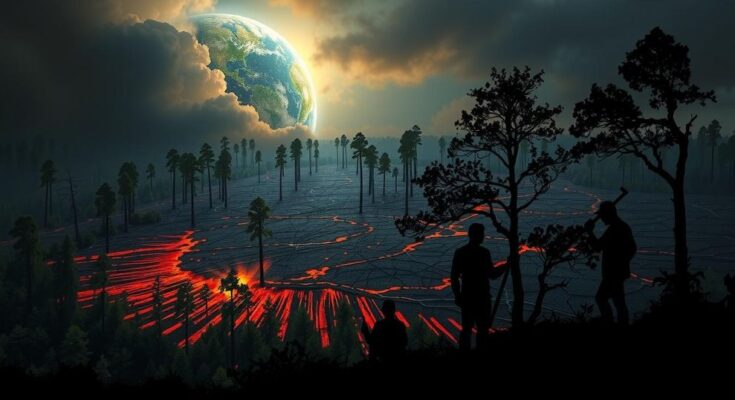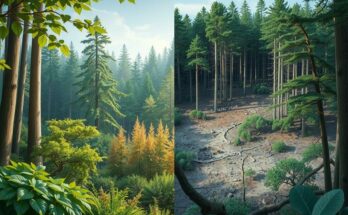Wildfires in Brazil’s Amazon have devastated around the same area as Switzerland, marking an alarming 846% increase in destruction compared to last year. Many are speculating that criminals might be using climate change to their benefit, opting for easier arson methods in the wake of severe droughts. Brazilian officials are now considering reforestation mandates to combat this issue as the upcoming COP30 looms, emphasizing an urgent need for policy changes.
In Brazil, wildfires have engulfed an area comparable to Switzerland, inflicting a level of devastation that may take years, if not decades, to repair. Following a historic drought, the smoke has finally lifted, revealing the startling loss of forest cover. According to Ane Alencar, a prominent figure at the Amazon Environmental Research Institute, the data reflects a shocking increase in destruction, with fire incidents rising 846% from the previous year. Between January and mid-October 2024, the devastation from wildfires was five times greater than what was seen in 2019. This alarming trend aligns with upcoming events, including the significant U.N. climate conference, COP30, to be held in the Amazon city of Belem next year. Understanding the surge in fires has raised concerns that criminals might be exploiting climate change to further their illegal activities. Typically, deforestation in the Amazon starts with chainsaw logging, leaving trees to dry before being set ablaze, but now with drought conditions, illegal operators are bypassing this step. As forests become increasingly parched, arsonists are igniting fires with far less effort, leading to catastrophic consequences. “The drought played a major role in fueling the spread, but fire has also been weaponized,” noted Alencar. Climate change, exacerbated by El Nino, has contributed to two years of severe drought in the Amazon basin, killing fish and stranding river communities. In September alone, the number of wildfires surged, inflating the total area burned to its highest level in a decade. This alarming rise was acknowledged during discussions at COP16 aimed at biodiversity preservation in Colombia, indicating a coordinated effort to tackle environmental concerns. Evidence suggests a nefarious connection between climate change and criminal activity, particularly in Jamanxim National Forest, a region plagued by illegal cattle ranching. Here, the combination of drought, criminal elements, and poor governance has led to a striking 700% increase in burned areas, as landgrabbers attempt to claim forested land. The Brazilian government’s urgent response includes discussions about reforestation mandates on burned land, aimed as a deterrent against illegal use. According to André Lima, officials need systemic changes to effectively counter the ongoing destruction, emphasizing a collaborative approach involving local jurisdictions. This growing trend of wildfires in the Amazon is symptomatic of broader, global climate change issues. A recent analysis warns that carbon emissions from forest fires have surged, increasing vulnerability across the globe. In contrast to wildfires in regions like North America, which engulf treetops, fires in the Amazon primarily consume ground vegetation, academically categorized as burn scars rather than deforestation. Despite the surge in wildfires, this year’s deforestation rate appears to be declining under President Luiz Inácio Lula da Silva, potentially achieving a 60% reduction compared to previous years. However, the destruction remains profound, with areas subjected to severe fire risking irreversible damage. “Another season of intense drought and fires could lead to the breakdown of the forest,” cautioned Claudio Almeida, underscoring the precarious fate of the Amazon rainforest.
The Amazon rainforest is facing a catastrophic increase in wildfires, fueled by human-induced climate change and prolonged drought. The surge in blazes has coincided with criminal activities, prompting investigations into whether illegal operations are being facilitated by environmental changes. As a vital ecosystem, the Amazon is crucial for biodiversity and carbon storage, but its vulnerability to fire is escalating due to anthropogenic pressures and climate fluctuations.
The dramatic rise in wildfires in the Amazon is a stark indicator of the intersection between climate change and criminal exploitation. The situation calls for urgent action from the Brazilian government and local authorities to implement protective measures for this vital ecosystem. With the world’s attention turning to the Amazon for climate discussions, the need for effective strategies to combat these fires and preserve the forest has never been more pressing.
Original Source: www.clickorlando.com



